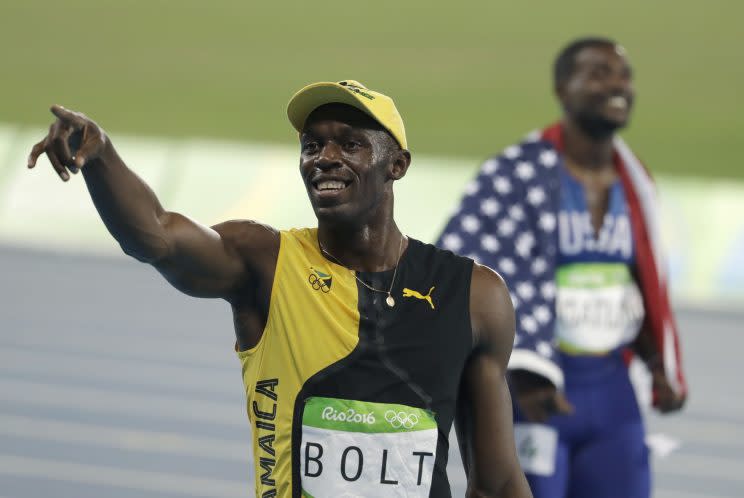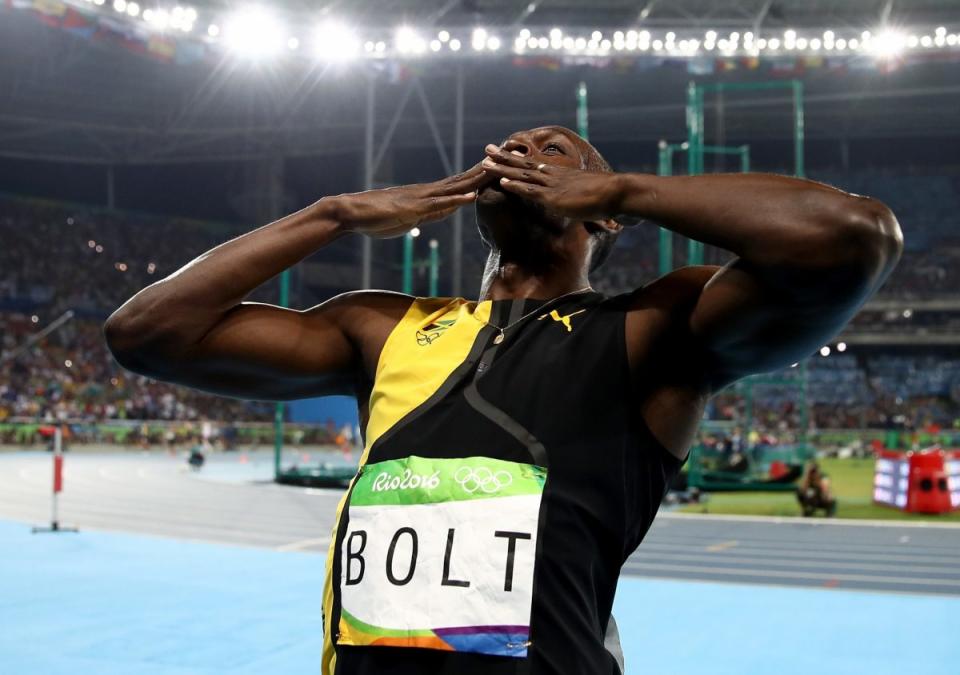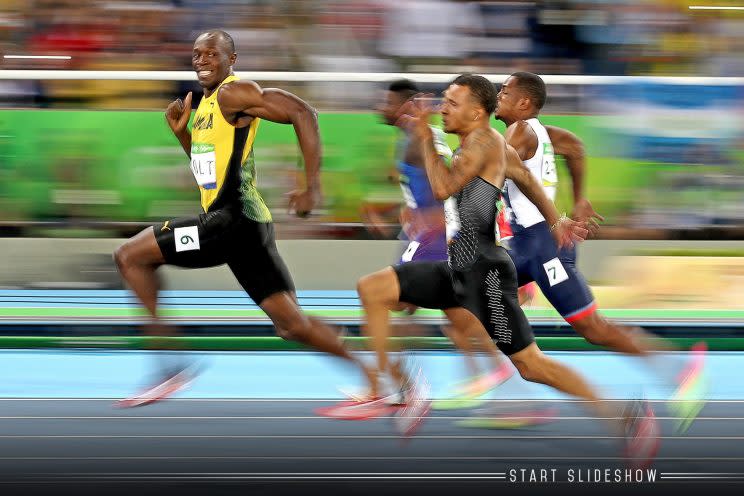Usain Bolt and the greatest 10 seconds in sports
Medal count | Olympic schedule | Olympic news
RIO DE JANEIRO – The greatest 10 seconds in sports, annotated.
0.0 seconds
The silence in the moments leading up to the starting gun of the men’s 100-meter dash at the Rio Games was eerie. Stadiums packed with nearly 50,000 people cannot possibly get that quiet, not when they’ve been so loud in the minutes before.
From the time Usain Bolt walked out of the tunnel underneath Olympic Stadium, a certain feeling pulsed through the crowd, a cocktail of awe and appreciation and delight at the pure spectacle. Bolt’s magnetism is redoubtable. The polarity is not one-sided, though. He’d come here to see them, too.
Bolt is the greatest showman in sports. He could turtle away from it all, curl into a myopic ball, and no one would blame him, because he’s Usain Bolt, and being the fastest man the world has ever known carries capital. Instead, before his biggest race in four years, the one for even more history than he already owns, he was pointing to each side of the stadium, calling for men and women and children to call back at him. He was joking with the suckers he planned on dusting, and he was bouncing along, all nonchalance and prance, and he was winking, because he’s Usain Bolt, and of course he would wink.
“Sports is looking for people who are full of energy and vibes,” Bolt said. “That’s what gets them going: the hype. They like to be part of the competition. Not so much watching it.”
This is what the Rio Games needed. They’ve been about gunpoint robberies and green fart water and doping and more doping and an extra helping of doping on top of that. Usain Bolt, the Jamaican hero, was here to save them.
Don’t get it twisted, though. Usain Bolt needs the Rio Games every bit as much as they need him.
1.0 second
Let’s get this out of the way: If there is anything bad to say about Usain Bolt, sprinting extraordinaire, the man who revolutionized track and lifted it closer to the breaches of human performance, it’s that he runs a pretty mediocre first second. It’s slow enough that during his semifinal race, as the runners stopped after thrusting off the starting blocks because of a false start, the stadium gasped, fearful Bolt had tried to avoid his slow start and DQ’d himself. It actually was a kid named Andrew Fisher, a sprinter for Bahrain who was born in Jamaica. He was distracted by a helicopter that hovered overhead and dipped lower and lower, louder and louder, all so the camera person inside could do one thing.
Zoom in closer on Bolt.

2.0 seconds
Bolt got off the blocks in .155 seconds, the second-slowest time of the eight runners, and immediately found himself behind Justin Gatlin, for years his fiercest rival but little more than Sham to his Secretariat. While Bolt steeped in cheers, Gatlin tried to fend off boos, the two doping offenses on his record – and him being the likeliest to dethrone Bolt – making him the chief villain Sunday.
“Justin Gatlin,” Bolt said, “is always going to get his signature start.”
Gatlin accelerated and took the early lead, which, B.B. – Before Bolt – meant something. In this race, the 2.0-second mark is inconsequential. Bolt has trailed at this juncture plenty before, and never has it seemed to stop him.
3.0 seconds
Three is an important number for Usain Bolt at the Rio Games. He’s running his usual three races: the 100-meter dash, the 200-meter dash and the 4×100-meter relay. Three is also the number of gold medals in each he’ll have if he sweeps them for the third consecutive time.
This would be laughable if it weren’t Bolt. Before him, only American Carl Lewis had won Olympic gold twice in the 100 – and his second came after the disqualification of Canadian Ben Johnson. On his attempt at a third, Lewis didn’t even qualify for the race. Winning the 200 again is even more audacious. Before Bolt, nobody had gone back-to-back. And not only does he want to win it, he wants to break his own world record of 19.19 seconds.
“I came to this Olympics to win three gold medals,” Bolt said. “I came to put myself again as one of the greats. And that’s my focus. So if, by any chance, I fail, I’m going to feel sad. Of course I’m not going to feel accomplished.”
Sprinting is not a sport conducive to longevity. Training sessions are brutal. Muscles tear. Ligaments snap. Tendons rip. Explosive movement defines great sprinters, and it limits their lifespans. For Bolt to compete in three Olympics, this one at 29 years old, is plenty. For him to consider anything less than a triple-triple a failure would feel crazy if it didn’t feel even more like an inevitability.
4.0 seconds
This is when Usain Bolt becomes Usain Bolt.
The typical sprinter takes somewhere between 44 and 48 strides over 100 meters. Bolt takes 40 or 41. At 6-foot-5, he is the tallest elite sprinter the world ever has seen. The other seven racers in the 100 stood 6-foot-2, 6-1, 5-11, 5-11, 5-9, 5-9 and 5-8. Bolt is simply a freak, somehow able to balance the length and power of his stride.
[RELATED: Bolt predicted van Niekerk would break 400 world record]
Four seconds into the race, Bolt’s legs churned, his posture more upright than the others, gaining, moving in, on the hunt. He passed some. His was primed to pass others. The fans recognized this. They weren’t looking at anyone else.
5.0 seconds
Five hours before the 100 started, a horn at Olympic Stadium sounded and a clock began ticking backward. On the scoreboard at both ends read a message in all capital letters: COUNTDOWN TO THE EVENT.
Usain Bolt races aren’t races. They are events, shows, entertainment distilled to its essence, food for the 50,000 here and billion or so worldwide. It’s impossible to overstate how much people love Bolt. Next to Michael Jordan, he is the world’s most beloved athlete. His shoes don’t sell by the millions. He doesn’t play a signature sport. He runs but a few times a year, if that. And still, every time he does race, the crowd devolves into full-on, throaty madness, cacophonous from gun to finish line, which was less than five seconds away.
Another clock was ticking on Usain Bolt.
6.0 seconds
The most iconic moment Sunday actually came in Bolt’s semifinal race. At the 5.5-second mark, he looked right and saw nobody. At 6.7 seconds, he looked left, to the young Canadian Andre De Grasse, who was in second. Getty photographer Cameron Spencer took the perfect picture. All of the field was straining, blurry, behind. And Usain Bolt was smiling, like a man who knew exactly what he was going to do later that night.
7.0 seconds
This is where he wins. In a 100-meter race, in less than 10 seconds, someone shouldn’t be capable of making up so much room so fast. To see Usain Bolt run, though, is to see a man defy what we’ve long believed possible and turn it into something we can’t believe is happening.
Gone were Trayvon Bromell and Jimmy Vicaut, Ben Youssef Meite and Akani Simbine, Yohan Blake and Andre De Grasse. And the last man he passed was Justin Gatlin, who, like so many times before, had no answer for the fastest man ever.
8.0 seconds
He was hurt. That’s the funny thing about Usain Bolt. There’s always that tiny seedling of doubt amid the resplendent crops of evidence otherwise that maybe this time around he won’t do it – that the start will be too slow, the stride off just a bit, the legs incapable of agitating in the perfect manner that propels him so.
This time it was the hamstring injury that kept him out of his country’s Olympic trials. Bolt received a medical exemption from Jamaica that allowed him to run, and he looked healthy enough in the qualifying heats, but still. Hamstrings are finicky. One bad step, one awkward landing, and it’s over, that easy.
Eight men stepped to the line at 10:25 p.m. local time Saturday. Seven of them understood the only way they would know 100-meter gold was by the grace a hamstring that needed to hold on for just two more seconds.

9.0 seconds
He slowed down a bit. Usain Bolt does this toward the finish line, almost by force of habit. He knew he wasn’t going to break his own 100-meter record of 9.58 seconds. He was too tired for that, his legs jellied by only 75 minutes of downtime between the semifinals and finals.
“It did affect me a little bit,” Bolt said. “My legs felt a little dead at the start.”
By now, they were resurrected, ready for the inexorable conclusion allowed by his hamstring and his training and his balance and his natural gifts and everything that makes Usain Bolt such a force of nature when his feet hit a race track.
9.81 seconds
“This is what I came here for,” Usain Bolt said, about two hours after he won the seventh Olympic gold medal of his career, after he was serenaded by a stadium chanting his name, after he was stopped by a woman who snapped a selfie with him and danced as he walked away and, as a thank you, giddily chirped: “I love you!” After he finished .08 seconds ahead of the silver medalist Gatlin and .10 seconds ahead of the bronze medalist De Grasse. After he continued a 100-meter dash winning streak that dates to 2011, when he disqualified himself with a false start at the world championships.
After plucking the seedling from the ground before it had a chance to sprout into anything.
“At the end of the day, may the best man win,” Gatlin said. “And today Usain was the best man.”
Not today. Every day.
10 seconds
This is why Usain Bolt needs the Rio Games. Because as others crossed the finish line in 9.93 and 9.94 and 9.96 and 10.04 and 10.06, the margin between first and last a quarter of a second, less than an eye blink, he was holding up his right index finger to remind the world what he was, just in case four years had caused any amnesia.
After his triple at the London Games, Bolt declared himself a legend. He already was, and he still is, and he will continue to be, even if he doesn’t complete the triple-triple. Should he, Bolt said, “I can become immortal. Two more medals to go and I can sign off. Immortal.”
The greatest 10 seconds in sports started with a blur and ended with a flourish, and everything in between was the amalgamation of energy and vibe and biomechanics and hard work and talent and all that makes Usain Bolt as amazing as he ever was, as amazing as we’ve ever seen.
More Olympics coverage from Yahoo Sports:



